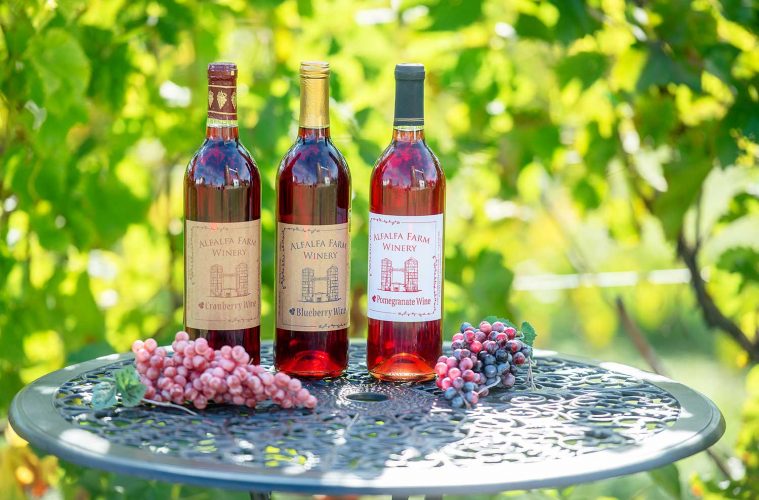Come fall, cranberries start appearing everywhere. Simmered into ruby sauces, studding apple pies, sprinkled atop seasonal salads. Trudi Perry wants to add another item to the cranberry menu: wine.
As the winemaker at Alfalfa Farm Winery, Perry crafts cranberry wine, as well as blueberry and pomegranate versions, alongside the winery’s more traditional grape-based offerings. And though serious oenophiles have been known to turn up their noses at such unconventional creations, Perry is out to prove that fruit wines can be as interesting, sophisticated, and tasty as the merlots and chardonnays of the world.
“People come in with pre-conceived notions,” she says. “There was a predisposition to not giving berry wines the same credence as grape wines.” Fruit wines, however, have a lot to offer, she says.
The cranberry wine can be served chilled with a main meal, Perry says; the tangy flavor is an excellent complement to turkey and gravy. The blueberry wine, which has won gold medals at the Indy International Wine Competition, has a smoother flavor and makes an excellent accompaniment to a strong blue cheese or sharp cheddar as an appetizer or dessert. In the summer, Perry says, the wines make refreshing spritzers when mixed with club soda and a squeeze of lemon; in the winter they can be savored in a snifter, allowing one to enjoy the aromatics.
“It definitely tastes like wine,” she says. “You almost find yourself trying to find a hint of a grape flavor in there—but there isn’t one.” Alfalfa Farm Winery has produced fruit wines on and off throughout its 21-year history, but they became a regular part of the lineup when Perry came on as winemaker five years ago. Today, the winery makes about 100 cases of fruit wine each year, as much as 30 percent of the total wine it produces. Like their grape-based counterparts, the fruit wines are made by fermenting a base of pure juice in a complex chemical process. “They are just as technical, just as finicky to work with,” Perry says.
The juice for the berry wines is sourced from East Coast growers; the pomegranate juice comes from the West Coast. Because yeast specifically for fruit wines is not yet available, red wine yeast is added to the juices to initiate fermentation. Once the fermentation is complete, Perry tastes the wine and adds just enough sugar to balance to flavors. If the acidity is too sharp, she softens it with reagents. When the wine has been tweaked to Perry’s satisfaction, the Alfalfa Farm Winery volunteer corps goes to work.
As with the vineyard’s grape wines, all of the fruit wines are bottled, labeled, and packed by a group of volunteers who are paid in wine and camaraderie. As many as a dozen volunteers—some of whom have been helping out for decades—gather to cork the wine, cap the bottles with foil, and hand-apply labels. There’s usually some sampling done along the way.
The final product is sold at a handful of liquor stores, including the Massachusetts Farm Wineries and Growers Association stall at the Boston Public Market. Visitors to Alfalfa Farm Winery can pay $6 to receive an etched tasting glass and to try their choice of five wines; many who try the fruit wines end up taking a bottle home, especially in the fall, Perry says.
“Our cranberry wine is in big demand come holiday season,” she says. Alfalfa Farm has operated in some form for centuries. A sign declaring the farm’s name spans two silos right off I-95, a familiar sight to those who frequent the highway. Until the 1970s, it was a dairy farm covering some 600 acres. It was subdivided, but an 11-acre parcel was sold to Richard Adelman with the understanding that it would be kept in agricultural use. For the next 20 years, the family raised beef cattle and horses on the land.
In the 1990s, the family decided to venture into winemaking, turning David Adelman’s hobby into a business. The first grapes were planted in 1994, and the winery officially opened the following year. Volunteers were a part of the model from the beginning; they help tend the vines, harvest the grapes, and crush the fruit. Today, the winery produces about 11 grape wines in addition to its fruit wines. Prices range from $17 to $22 a bottle.
The winery has evolved alongside the growing interest in agritourism. In 2004, an aging barn came down and was replaced with a tasting room and patio, a popular place for events like corporate outings and bridal showers. Throughout the fall, the public is welcome to stop in for tastings Saturdays and Sundays from 1 p.m. to 5 p.m.
And Perry thinks visitors willing to look beyond the basics are going to like what they taste. “I would argue fruit wines have got a place right up there,” she says.
Alfalfa Farm Winery
267 Rowley Bridge Rd., Topsfield
978-774-0014

